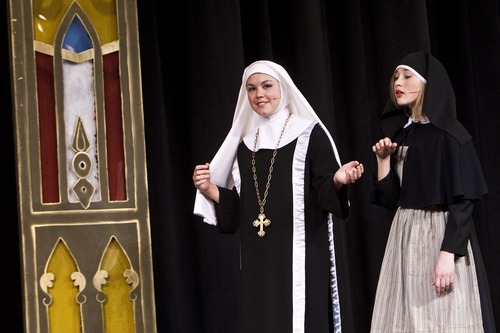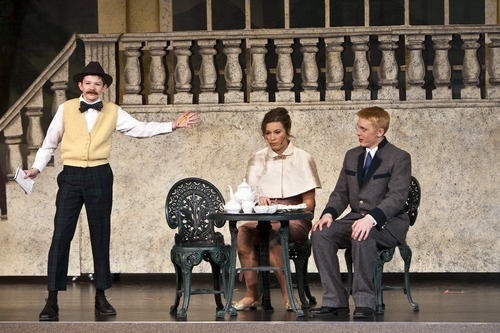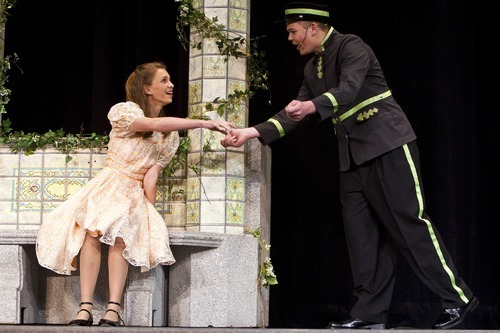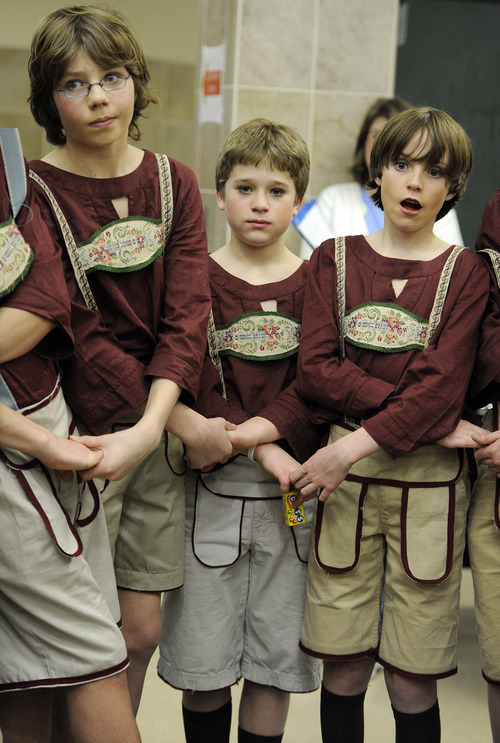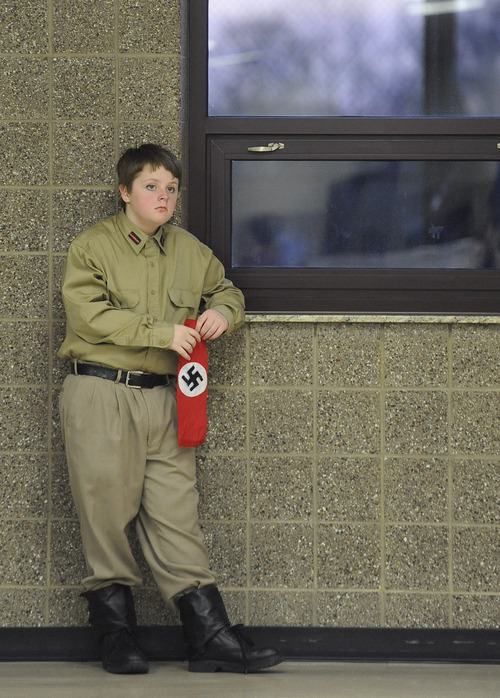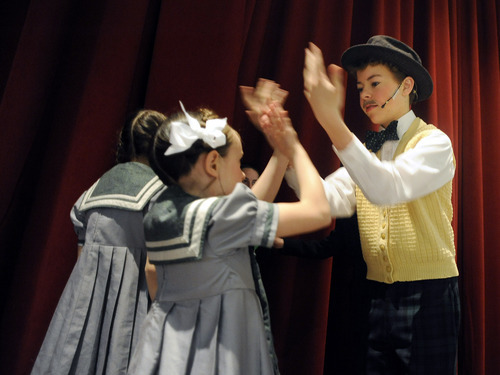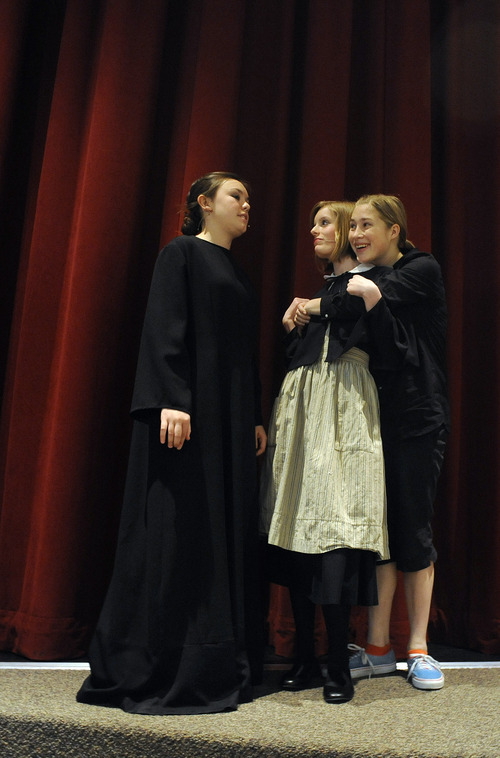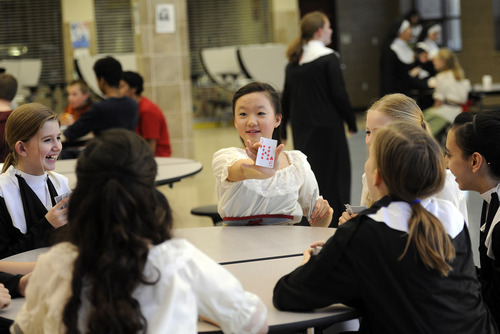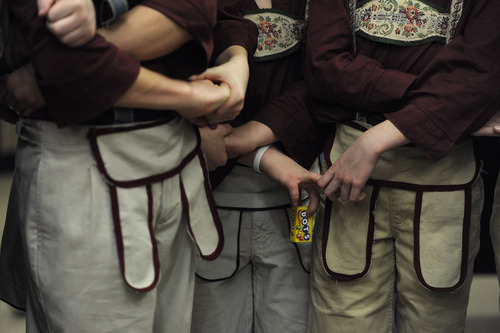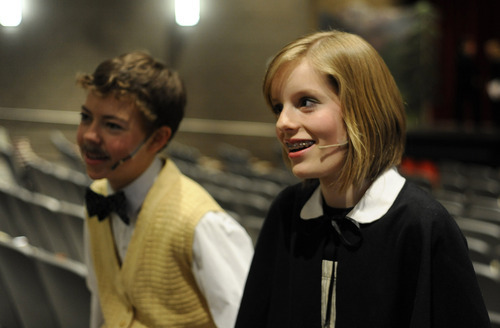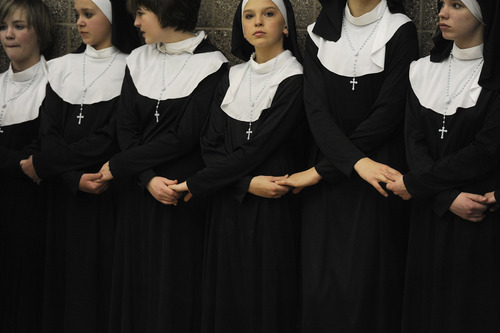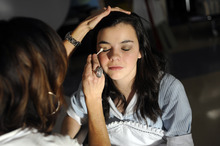This is an archived article that was published on sltrib.com in 2011, and information in the article may be outdated. It is provided only for personal research purposes and may not be reprinted.
Let's start at the very beginning: monotone delivery, swallowed words, everything said too fast; stiff bodies, slouching bodies, bodies that can't sit still; and that annoying habit of ending a phrase of dialogue with a rise of the voice, as if it were a question?
Of course, that's the glass-half-empty version of Clayton Middle School's "The Sound of Music," and director Nanette Kearl has always been a glass-overflowing woman.
So on an afternoon in January she stands on the school stage, looks around the auditorium and sees what someone more skeptical cannot: 230 teenagers who, in two months, will learn how to act — who will learn both how to sound like someone they're not and how to be better versions of themselves.
That's 230 chatty, fidgety, texting seventh- and eighth-graders in what is quite possibly the largest production ever of "The Sound of Music," so large in fact that it caused the play's licensing company to wonder if Kearl had rewritten the script. She explained that she was simply thinking big: a double cast of leads, 63 nuns, 27 party guests, 29 Nazis, and on and on.
Kearl's goal isn't just to put on a first-class musical, but also to cast as many students as try out, as long as their grades and citizenship keep them eligible. Every year the musical gets bigger and more elaborate.
She volunteers to do this because she believes in theater and in teenagers, and in what happens when you trust the two to transform each other. Still, it's never an easy ride, even if you're unflappable. Before she gets to opening night there will be questions about commitment, drama over the kisses written into the script, that incident of the swastikas in the boys bathroom, sleepless nights and tears.
And even a week before opening it will seem, to a skeptic at least, that this will be the year when the musical might never quite come together.
—
13 going on … • Being 13 or 14 means you aren't a tweener but still in between, still a boy in braces but also mature enough to convincingly play a 40-year-old man. Which brings us to Clayton's dance room on an afternoon in early January.
Josh Whisenant walks up to the wall of mirrors and punches toward it with his fist. "I don't know why I did that," he says to several of the other leads who have gathered for diction work.
Josh is an industrious eighth grader who practices the piano for an hour before school each day and swims for two hours in the afternoon. He talks with the deep voice of a man, is serious and considerate, and reports that he eats four apples a day.
He's new to Clayton this year. The school sits on Salt Lake City's East Bench, drawing students from the upscale Harvard-Yale neighborhood, middle-income Sugar House and Central City.
On his first day, Josh says, he walked into the school feeling mean and tough, then looked around and said "What is this?" No one had headphones on, no one was pushing the dress code to the limits. People were being nice to each other. He also soon discovered that "the cool thing to do is to be in the play."
Josh shares the role of Captain von Trapp with Ethan Bennett. Kearl double-casts most lead roles to give more students a chance to perform and to have a built-in understudy. The upside is that the students can learn from shadowing their counterpart; the downside is that for the first month there are two sets of each character onstage.
This year it also means that 33 young actors must learn how to sound not like 21st-century Utah teenagers, but pre-World War II Austrians who happen to speak English. This task falls to Lee Willis, a veteran actor who has volunteered for the Clayton musical for four years.
His job is to get rid of the students' "r's", their broad vowels, their lazy consonants and their tendency to mumble quickly through dialogue. To get them to say "frienDs" not "frenz," "Keut" not "Kurt." To get them to be bigger onstage: more menacing or earnest or flamboyant.
He knows how hard it is to be bold. As an eighth-grader in San Diego in the 1960s, he was a transfer student, an outsider who was painfully shy until a teacher suggested he join a drama class. Then came a part in the school's production of "Cinderella." When scenery fell over, he learned he had a knack for improvising. There were standing ovations.
"Get out of this kind of mind-set of speaking like a 14-year-old girl," Wallis tells Sarah Sheffield and Ellie Carlson, double cast as the snooty Baroness Elsa Schraeder. "Talk like your mother."
"That's weak, I want it stronger," Willis instructs Atticus Edwards, who plays the Nazi Herr Zeller. "You said that like you were ordering a pizza."
Willis tells them: "You're going to hate me until opening night."
—
How do you solve a problem like … • Being 13 or 14 is always about learning how to act: how to curb your urge to hang upside down on the railing in the auditorium. How to stifle your desire to chew gum when the director has reminded you a million times about the no-gum rule. How to sit patiently through 100 hours of rehearsal. How to sacrifice.
On a sunny Friday in February, with fresh powder in the mountains, Johny Fredrick texts Kearl to say he's going skiing. Johny is one of the show's two Rolfs, the 17-going-on-18 telegram delivery boy who joins the Nazis after wooing 16-going-on-17 Liesl von Trapp. Johny is student-body president, the kind of boy whom other boys crowd around and girls lean toward when he's talking.
Already, during the past six weeks, Johny has missed several rehearsals and has left early to get to ski team practice. Today, when Johny shows up 90 minutes late, Kearl sits down with him on the steps of the stage to have a talk. Does he really want to be in the musical?
Later, in the empty auditorium, Kearl wonders, "Am I asking him to be something he doesn't want to be?" Johny's ambivalence makes her sad. And then she thinks of another cast member, seventh-grader Erik Hulbert, and Kearl begins to cry. "I have a kid whose mother is dying. They sit and talk about the play so they don't have to talk about the inevitable. He has only so many moments with his mother and he comes to play practice."
Kearl leaves school feeling demoralized, but later that night Johny and his mother drive to Kearl's house to tell her he's decided he'll quit the ski team, even though it cost him $750, money he earned mowing lawns and shoveling walks.
Johny says he doesn't want to disappoint his parents or his big brother, who had a starring role in last year's Clayton show. Many of the cast have siblings who have performed in one of the past 11 productions; this is one way Kearl creates the kind of buzz that persuades teenage boys to be in a musical, even if they might have to wear sailor suits. Most of them just a year or two ago sat in this same auditorium as sixth-graders and idolized the big kids onstage.
Kearl is relieved that Johny is still on board, but won't be convinced until she sees how much energy he's willing to put into his part.
The next day, on Valentine's weekend, a dozen girls from the cast sneak into Kearl's yard and plaster the door and fence with pink paper hearts. They leave her gushy notes, full of exclamation marks.
"My girl! You are truly amazing to find a way to make each and everybody feel special," writes Nell Stevens, who plays Liesl.
Kearl teaches dance at Clayton but volunteers hundreds of hours to direct the play. She lives in the Clayton neighborhood, though she currently has no children at the school. The bottom line, says volunteer stage manager Becky Dunham, is that Kearl respects the students.
"She doesn't wear them down, she loves them up," is how Kearl's husband explains it.
And it's true that on the rare occasion when Kearl shows the slightest frustration with the student actors, she hardly raises her voice. She refers to them as "men and women." She always says "please."
—
Totally unprepared am I … • When you're a boy who is 13 going on 14, you might never have kissed a girl. But a musical that theoretically includes three kisses might give you the opportunity.
Although junior highs in Utah with ninth-graders sometimes include a stage kiss, Clayton is a middle school, so there's always been an unofficial no-kiss policy. But that doesn't mean The Kiss doesn't become a significant subplot as rehearsals progress. "It's just a storm, this kiss," reports Josh Whisenant's mom. "It's all he talks about."
Some of the boys, in fact, have been raising money to persuade Josh to kiss his Maria, Abi Busath, and some of the girls have been trying to talk Ethan Bennett into kissing his Maria, Eden Brush.
In January, there's this exchange between Lizzie Card, one of the two Liesls, and Nanette, during the "16-Going-On-17" scene with Max Hamilton.
Lizzie: A hug? That's weak.
Kearl: Do you want to kiss him?
Lizzie: No, I don't. I'm just saying. (pause) What about a kiss on the hand?
Kearl: A kiss on the hand is kind of old.
All through February, Kearl tries to help Abi and Eden get comfortable with embracing their captains in the scene where they decide to get married. The first time they try it, Josh keeps his hands in fists, Abi keeps her sweatshirt sleeves over her hands, and the whole thing appears more like two football players congratulating each other.
—
Climb ev'ry mountain • And so the rehearsals proceed. And at each one, Kearl and volunteer choreographer Melanie Robbins and chorus teacher Michelle Dodge get the students one step closer. It's time now for the subtleties: how to pause longer between a line to suggest hesitation, how to sip a cup of pretend coffee as if it were hot.
Kearl turns to the leads who are sitting in the first few rows of seats. Keep your hands out of your pockets onstage, she tells them. Don't laugh when you're not supposed to be laughing. Stay in character, she reminds them over and over, especially to the two dozen rambunctious boys who are Nazi soldiers.
Still, onstage during an all-day rehearsal at the end of February, the Nazis slouch and smirk. In the back of the auditorium, when they're supposed to be quietly watching the play, one of them pulls on the skin of his neck and makes animal noises, and another gets out a tennis ball and throws it against the wall. The din and the bouncing get louder.
Later in the day, the school's principal, Linda Richins, makes an announcement: Someone has been drawing swastikas in the boys bathrooms. "I don't know if you understand what that symbol means to people," she says. "It's a very bad part of human history."
But along the way there are also small victories. "See this boy," says Kim Sheffield, the Parent Teacher Student Association president and mother of a baroness, pointing to the cast bios posted along the auditorium walls. "He would never hang out with that boy or that girl if it weren't for this play."
Later in the week, the two Marias get their long locks cut off so they'll look more like the iconic Maria, Julie Andrews. Abi has watched the movie version of the musical so many times in her life, says her mother, that "it's in her DNA."
Abi, considered one of the best 8th-grade soccer goalies in the state, had expected to get a minor role when she auditioned for the play in November. Eden, who has always loved being onstage, has never sung a solo part before.
The Marias have become best friends over the past two months. At random times during their ordinary life, they find themselves speaking with clipped European vowels.
They bought a special notebook just for the two of them, where they write down their favorite "Sound of Music" lines, and some poems about being Maria. "Eden's poem is so epic it isn't funny," says Abi. It's a long poem that includes these lines:
The one whose love for the Captain is oh so very strong,
The one with 11 clothes changes and nearly 20 songs.
And:
The one who found out what "Climb Every Mountain" meant.
"That's the deep part," Eden says.
One week of rehearsals left, and there are still missed cues, slow costume changes, off-pitch, painful harmonies, and scenery that takes much too long to move off the stage. The show threatens to clock in at four hours.
At the end of the week, there are tears in the auditorium: Seventh-grader Erik Hulbert's mother died that morning of cancer.
—
Till you find your dream • Suddenly, it's opening night. Eden's voice, so scratchy from a cold the day before that she couldn't sing, is on the mend. Kearl is in the wings, stage right, to help move scenery and be ready with a cue if needed.
The house lights dim. A church bell chimes three times. Then three more. Spotlights shine on the four nuns: Camille Jackson, Liv Hunter, Judy Vo and Mother Superior Emma Gleave.
None of them set out to be a nun — most of the girls wanted to be Maria or one of the von Trapp children — but the roles turn out to be fun, and the performances stunning. Soon they are joined onstage by the Abbey's 63 novices and postulants, each carrying a candle through the darkened theater, each chanting in Latin.
The show, one of six performances, is sold out — one advantage of a 230-member cast. Kearl won't divulge production costs — for the rented scenery from Utah Festival Opera, the 493 costumes, the professional sound and lighting engineers with their 24 wireless mics.
But so far, over the past 11 years, Clayton musicals have always paid for themselves, with the help of parent, neighbor and PTSA sponsorships that this year totaled more than $2,800. In addition, 300 parents volunteered to make and iron costumes, paint scenery, do makeup, and feed the cast during all-day rehearsals.
The measure of a middle-school play's success, Kearl says, isn't the number of tickets sold or the standing ovations, but how much the students grow along the way. By that measure, even a skeptic might say this "Sound of Music" deserves a Tony.
For example, two months ago, Chase Verhaaren was a shy kid and Sam Hallman read his lines at such a fast clip it was hard to understand him. But on their respective opening nights, both are scene-stealers in the role of the flamboyant impresario Max Detweiler.
The Nazis, so squirrelly during rehearsals, stand at attention without so much as a smirk. Johny — the boy who in February would rather have been skiing — is actually having fun. The two Elsa Schraeders appear sophisticated and European, not like 14-year-old girls at all.
Lines are delivered as if they're not just a string of words but are deeply felt — by a man who is still grieving over a dead wife, and a young woman who is trying to obey the will of God.
At the closing matinee, illness strikes: Ethan, who plays the Captain, and Lizzie, who plays Liesl, are nauseated, pale and sweating, but they keep acting. On closing night, Josh finally kisses Abi on the lips.
—
So long, farewell • When you're 14, it's very possible that a middle-school musical will be the last time you'll act or sing or dance in anything. When Clayton's eighth-graders enter high school next year, they'll be busy with sports or a part-time job. Likely, they'll think of drama as something that theater geeks do. They and their parents will have left the carefree innocence and ebullience of the Clayton musical behind.
And so here we leave them. Emma Gleave, looking beatific as the Abbey's Mother Superior, is just reaching that crescendo in "Climb Every Mountain," the one that makes even a skeptic want to weep for joy. The von Trapps are climbing the Alps to escape the Nazis.
In real life, the von Trapps didn't actually walk over the Alps to escape; they took a train. At Clayton, the eighth-grade von Trapps are climbing the auditorium steps. This is a junior-high musical. Anything is possible.
How the snippets became a story
Editor's note: Elaine Jarvik knew she wanted to tell a backstage story after watching granddaughter Morgan Birch perform as Dorothy in the 2010 production of Clayton Middle School's "The Wizard of Oz." To write "The sound of being 14," Jarvik followed the production for two months, from the posting of audition notices through rehearsals and performances, interviewing actors, parents and volunteers, even trailing the two young Marias as they got haircuts for the role.


